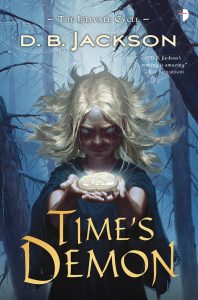Last week, John Hartness, my good friend and the owner and editor at Falstaff Books, posted on Facebook about something he was seeing while editing manuscripts. Many of his writers were starting too many lines of dialogue with, “So…” As John said in the post, “We do this in real life, and it does sounds realistic, but most of us (myself 100% included) are using it too often, and it doesn’t work as well on the page as it does in real live conversation.”
What I found especially interesting about John’s post was the response to it. Writer after writer (including me) confessed to relying on all sorts of repeating words and phrases — what we in the industry call “crutch words.”
I use “So…” a bit, though not that much. On the other hand, lately my editors and I have noticed that I start way too many lines of dialogue with “Well…” As with “So…” it is something lots of us do in actual conversations, but on the page it becomes intrusive and repetitive.
I have lots of other crutch words, too, but honestly I’m reluctant to share them with you, because I don’t want you looking for them while reading my books and stories. Once you start doing this, it can totally ruin a work of fiction for you.
Suffice it to say, all of us have verbal tics that show up in our prose — words we overuse, approaches to dialogue that occur again and again, mannerisms we give to our characters that repeat themselves throughout our stories. Sometimes they are the result of habit. I know that in my case they often are a product of laziness — I need a gesture or a spoken word, and rather than pausing to come up with something different and unexpected, I throw in a standby. Moreover, even as we work to eliminate some crutches from our writing vocabularies, new ones creep in. (For me, “Well…” didn’t used to be a problem, and I’m not entirely sure when it showed up.)
So how do we deal with this issue?
First, understand that this doesn’t make you a bad writer. All writers from beginners to seasoned professionals grapple with crutch words. Don’t let yours undermine your confidence.
The key, of course, is to identify your wording habits and control them. Beta readers can be enormously helpful in this regard. When you ask people to read your manuscripts, by all means ask them to look for plotting problems, and character inconsistencies, and all the other narrative problems we writers sometimes face. But also ask them to keep an eye out for overused words and phrases. If and when they find some, start a list and keep that list around for future projects.
If you don’t have Beta readers, or don’t want to wait for outside feedback, try reading your books and stories aloud. This is one of those problems that we can gloss over all too easily when reading through a manuscript. But if we read the work out loud, and thus hear the story as well as see it, we are more likely to recognize those annoying repetitions. Again, as we find them, we should add them to our list.
Once we start to develop a bank of overused words, we can use the search function in our word processing software to find all instances of a given word or phrase and look for ways to replace some of the offending passages with something else. Remember, you don’t need to eliminate every “So…” occurrence (or whatever crutch you happen to be looking for at a particular time). The idea is to use the word/phrase in moderation.
How many instances is too many? A good question, and the truth is I don’t have a great answer. I might use as a yardstick one of my completed books, one I believe is well-written, polished, and relatively free of crutch words. If the new book has way more “Well…”s (for instance) than that old one, I assume there’s a problem and I try to fix it. If the numbers in the new book are about the same as, or lower than, the older yardstick, I move on to the next crutch. I will confess that my running list of crutch words/phrases has probably 50 entries. Maybe more. Some I’ve managed to control and eliminate as problems. Others, not so much. And, as I said before, I’m always adding new ones.
Finally, keep in mind that most readers don’t notice our crutches nearly as much as we do, or as a good editor might. Chances are one or two verbal mannerisms are going to sneak by our attempts to limit them and will wind up in the published version of our book. Don’t worry too much about that. Make sure the word is on your list, so you can address the issue in subsequent manuscripts, and then move on.
So, best of luck.
Well, keep writing.









 But when do I consider the manuscript done? There is some truth to that first answer I gave. I consider all my books works in progress. My very first book, Children of Amarid, published in 1997 and recognized with a Crawford Award two years later, was, to my mind, never really complete. I knew for years that I could make it better. And when we finally got the rights back, I edited the book mercilessly (and did the same to its two sequels) and released the
But when do I consider the manuscript done? There is some truth to that first answer I gave. I consider all my books works in progress. My very first book, Children of Amarid, published in 1997 and recognized with a Crawford Award two years later, was, to my mind, never really complete. I knew for years that I could make it better. And when we finally got the rights back, I edited the book mercilessly (and did the same to its two sequels) and released the  When we talk about craft, we usually focus on elements of initial creation – world building, character building and development, plotting, structuring and pacing a story or novel, and all the pitfalls we encounter when writing our stories. And certainly those are topics worthy of vigorous exploration.
When we talk about craft, we usually focus on elements of initial creation – world building, character building and development, plotting, structuring and pacing a story or novel, and all the pitfalls we encounter when writing our stories. And certainly those are topics worthy of vigorous exploration.
 I’m delighted to announce that the Author’s Edit of Children of Amarid is now available from Lore Seekers Press in ebook format and trade paperback. The book bears the original art work by Romas Kukalis, as will the subsequent volumes, which we hope to publish in September and December respectively. I have not changed the story in any way. The plot twists, characters, world building, and magic system all remain as fans of the original novels will remember them. But the prose has been polished, made leaner and more concise. The result is a novel that reads as I wished it had all those years ago.
I’m delighted to announce that the Author’s Edit of Children of Amarid is now available from Lore Seekers Press in ebook format and trade paperback. The book bears the original art work by Romas Kukalis, as will the subsequent volumes, which we hope to publish in September and December respectively. I have not changed the story in any way. The plot twists, characters, world building, and magic system all remain as fans of the original novels will remember them. But the prose has been polished, made leaner and more concise. The result is a novel that reads as I wished it had all those years ago.